BOAS - breathing problems in flat-faced dogs
Overview
- BOAS stands for Brachycephalic Obstructive Airway Syndrome.
- Brachycephalic means ‘short head’ (or flat-faced).
- Flat-faced breeds often have trouble breathing because of the shape of their head.
- Flat-faced breeds have a normal amount of tissue packed into a much shorter head. This means they often suffer with narrow nostrils, nasal passages and windpipe. They also often have an overlong soft palate. These issues often result in breathing problems, known as BOAS.
- BOAS can severely impact your dog’s quality of life.
- If your dog develops sudden breathing problems, contact your vet immediately.
What is BOAS?
BOAS (Brachycephalic Obstructive Airway Syndrome) is the name given to breathing problems caused by dogs having flat faces. It is caused by selective breeding and can cause serious health and welfare issues. BOAS commonly affects flat-faced breeds including:
Flat-faced dog breeds have become popular pets because of their appearance and good nature. Many owners think the snuffles and snoring noises made by their flat-faced dogs are normal, however, these noises are a sign that their dog is struggling to breathe.
BOAS includes one or more of the following primary issues:
- Narrowed nostrils — meaning less air can get in through the nose and each breath takes more effort. Some affected dogs may only be able to get enough air by panting and breathing through their mouths.
- Crowded nose and throat — the same amount of tissue that longer-nosed dogs have is packed into a much smaller space, obstructing the airway and adding to the difficulty of getting enough air
- Elongated soft palate — a large soft palate (the soft back part at the top of the mouth) blocks airflow into the windpipe, making breathing difficult and resulting in the snuffling/snoring noises in dogs with BOAS
- Narrow (windpipe) — breathing through a narrow windpipe is a bit like trying to breathe through a drinking straw, it’s very difficult! There are also two sacs inside the windpipe that can be enlarged and cause further problems.
The extra breathing effort these issues create can then lead to secondary problems, for example, collapse of the airway — including the windpipe (trachea) and the larynx (flaps at the top of the windpipe also known as the voice box). Once secondary changes have developed they can be more difficult to treat.
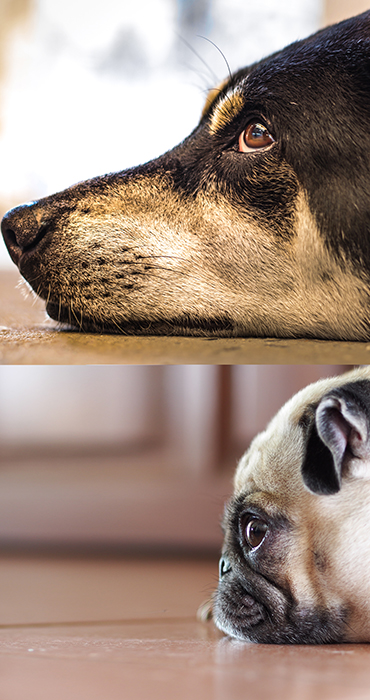
A non-brachycephalic dog nose vs. a brachycephalic dog
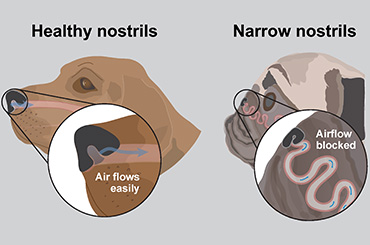
1. Narrow nostrils. Click image to enlarge.
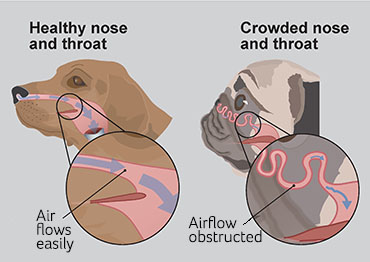
2. Crowded nose and throat. Click image to enlarge.
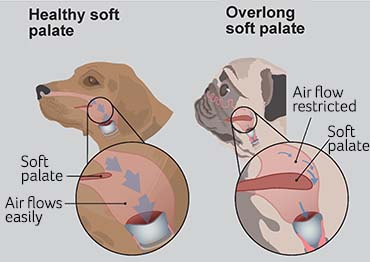
3. Overlong soft palate. Click to enlarge.
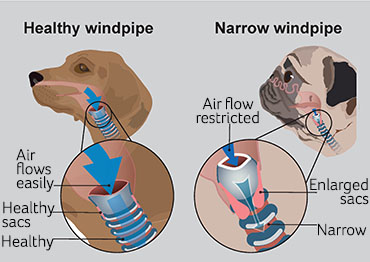
4. Narrow windpipe. Click image to enlarge.
Symptoms
The symptoms of BOAS can appear in puppies but sometimes don’t start until dogs are two–four years old. Symptoms include:
- Noisy breathing (including snuffles)
- Snoring
- Difficulty breathing
- Disrupted sleep
- Excessive panting, even when resting
- Unable or unwilling to exercise
- Struggling in hot weather (flat-faced dogs are more prone to heatstroke)
- Difficulty eating
- Regurgitation or vomiting — from the pressure created in the abdomen (tummy) from struggling to breathe
- Cyanosis (blue-coloured skin)
- Collapse
Heatstroke and/or a sudden increase in breathing difficulty can lead to collapse and is an emergency.
Diagnosis
Diagnosis is based on an examination and the symptoms above showing in a flat-faced breed. Your vet might also ask you to walk your dog around for a few minutes to see if symptoms are brought on or made worse by exercise. Your vet may suggest looking at your dog’s airways under an anaesthetic using an endoscope (a special camera), although this is usually only done with the plan to perform surgery to fix the problems at the same time. Your vet might refer you to a specialist for this. A specialist might also carry out scans such as an MRI scan.
Treatment
Surgery
Your dog might benefit from surgery to correct some of the problems causing their breathing difficulties. This might include widening their nostrils and shortening their soft palate. Surgery should be done earlier rather than later for the best chance at a good outcome. There are a number of risks associated with surgery and it’s important to discuss these with your vet. However, the surgery is likely to dramatically improve your dog’s quality of life. Your vet may refer your dog to a specialist.
Keeping an ideal weight
Since they often have trouble exercising, flat-faced dogs are prone to weight gain. Extra weight on a flat-faced dog is likely to make breathing worse as it adds to the tissue around their neck and face, causing airways to narrow even more. Speak to your vet or vet nurse for weight advice.
Exercising
Keep your dog as fit as possible and build their fitness gradually. Don’t be tempted to take them for a long walk if they aren’t used to it. Flat-faced dogs often struggle to keep up with other breeds. Put your dog on a lead if they are struggling to chase another dog. If your dog does too much exercise this can cause swelling to their airways and mean they struggle to breathe or collapse.
Attach your dog’s lead to a harness instead of their collar — pressure on their neck will make breathing more difficult. If you notice your dog starts breathing heavily or panting while you’re out for a walk, let them rest for a while then slowly bring them back home.
Avoid hot weather
It’s difficult for flat-faced breeds to stay cool on hot days, as dogs lose a lot of heat by panting, which is less effective in dogs with flat faces. They can therefore be very sensitive to heatstroke, which can be fatal. On hot days you should only take your dog for short walks when it’s cool (early morning and late evening). If it is too hot all day then it’s better to skip your dog’s walk until a day when it is cooler. Monitor your dog during walks and only take them as far as they are comfortable — remember you have to get back! Always take plenty of water on walks even if it doesn’t seem that hot for you, as this will help them cool down.
Prevention
BOAS is inherited from the parents, so if your dog is suffering from BOAS or any of the symptoms listed above it is important not to breed them, even if surgery has improved their symptoms.
We always recommend thinking very carefully before getting a brachycephalic dog because of the serious health and welfare concerns, including BOAS. Health and welfare is the most important consideration when thinking about getting a dog.
If you’re considering buying or rehoming a flat-faced breed of dog, make sure you are aware of any health problems they have or might develop. Take time to research the breed and think about whether they will fit into your lifestyle.
If you still want to buy a brachycephalic puppy, The Kennel Club and University of Cambridge’s Respiratory Function Grading Scheme is available to assess Bulldogs, French Bulldogs and Pugs for breathing problems and can be performed by a specially trained vet. Combining the grades for a sire and dam (mother and father dog) can help to indicate the potential health of their future puppies. If you are looking for a puppy from one of these breeds you should check that their parents have a low BOAS grade from this scheme. However, it is important to remember that a low score doesn’t guarantee the health of the puppy, as genetics can be very complicated.
Outlook
The outlook for your dog depends on how severely their breathing is affected. Struggling to breathe can really affect your dog’s quality of life, so it’s important to get help for your dog, even if they only have mild signs of BOAS. Earlier treatment for BOAS is also likely to have a better outcome.
Cost
Treatment for a dog with BOAS can become very expensive, especially if they need specialist surgery. It’s important to speak openly to your vet about your finances, the cost of treatment, as well as what you think is right for your dog.
Consider insuring your dog as soon as you get them, before any signs of illness start. This will ensure you have all the support you need to care for them. Insurance for some flat-faced breeds can be more expensive and may have certain exemptions, including BOAS, so be careful to read the small print.
- Are there any other health issues for flat-faced dogs?
- Are any other pets affected?
- Why should my dog have surgery for mild symptoms?
- Isn’t snoring normal?
Are there any other health issues for flat-faced dogs?
As well as BOAS, flat-faced dogs can be more prone to eye and teeth issues because of the shape of their skulls. They are also prone to skin issues and allergies because of their wrinkly skin, plus gastrointestinal (gut and stomach) and heart problems. Some flat-faced dogs also have trouble having puppies naturally because of the large size of puppies’ heads relative to their mum. Their flat faces can also make having an anaesthetic riskier than for dogs with longer faces.
Are any other pets affected?
Flat-faced cats such as Persians and Burmese can also suffer from symptoms as a result of obstruction of their airways. Flat-faced rabbits such as dwarf lops can have serious dental issues, as well as issues with sneezing and nasal discharge. Any flat-faced pet is also prone to other health problems so speak to your vet if you are concerned.
Why should my dog have surgery for mild symptoms?
BOAS is a progressive condition, meaning it will get worse over time. If your vet has recommended surgery it is best to get this as soon as possible to help stop the problems from getting worse and even progressing to the point where they can no longer be treated. Earlier surgery has a better chance of a good outcome.
Isn’t snoring normal?
Snoring is a sign that your dog’s breathing is disrupted when they’re asleep. In dogs with longer faces this can be normal, for example it might be because of their sleeping position. It might also be an indication that they are overweight. However, in a dog with a flat face, snoring is often a result of airway obstruction which can get worse over time. It’s always best to speak to your vet if you’re concerned about your dog’s snoring. Noisy breathing at rest or with very mild exercise also indicates an issue.
Published: May 2023
Did you find this page useful?
Tell us more
Please note, our vets and nurses are unable to respond to questions via this form. If you are concerned about your pet’s health, please contact your vet directly.
Thank you for your feedback
Want to hear more about PDSA and get pet care tips from our vet experts?
Sign up to our e-newsletter
Written by vets and vet nurses. This advice is for UK pets only. Illustrations by Samantha Elmhurst.

